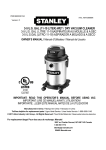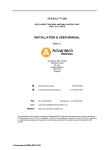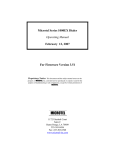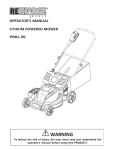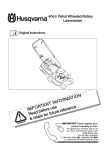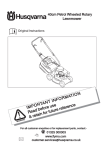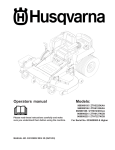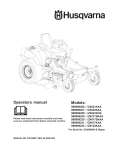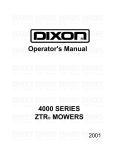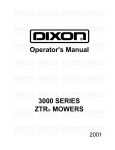Download Recharge Mower PMLI-20 Instruction manual
Transcript
Instruction Manual 36V Lithium Push Mower PMLI-14 This Manual Contains Important Information Regarding: SAFETY, ASSEMBLY, OPERATION AND MAINTENANCE. Please Read And Keep This Book For Future Reference. 1 2 3 4 7 5 8 9 10 6 8 11 16 17 18 2 12 13 14 15 1 Safety button 11 Battery pack 2 Switch lever 12 Safety key 3 Handle knob 13 Power cord for charger 4 Cable clip 14 Charger 5 Battery cover 15 Mulching Insert 6 Height adjustment lever 16 Battery temperature indicator 7 Upper push bar 17 Battery power indicator 8 Grass catcher indicator 18 Switch button for indicator 9 Grass catcher bag 10 Quick fold lever Intended Use ■ This lawn mower is designed for residential use ONLY, not for commercial use. ■ Use only for intended purpose. Safety Notes Warning! It is important that you read, fully understand and observe the following safety precautions and warnings. Careless or improper use of the machine may cause serious or fatal injury. The user is responsible for any accidents involving other people or other people„s property. Explanation of symbols on the lawnmower General hazard safety alert. Read instruction manual. Beware of thrown or flying objects to bystanders. Keep bystanders a safe distance away from the machine. Sharp blade. Beware of severing toes or fingers. Switch off, remove battery power plug from battery power socket before adjusting, cleaning, performing any maintenance work and before leaving the lawnmower unattended for any period. 3 Not applicable. Wait until all machine components have completely stopped before touching them. The blade continues to rotate after the machine is switched off. A rotating blade can cause injury. Do not mow in the rain or leave the lawnmower outdoors when it is raining. Beware electric shock hazard. Keep away from cords. Only use the battery charger indoors. Battery charger contains a safety transformer. ■ Never allow children or people unfamiliar with these instructions to use the lawnmower. Local regulations may restrict the age of the operator. ■ Never mow while people, especially children or pets are nearby. ■ The operator or user is responsible for accidents or hazards occurring to other people or their property. ■ Do not operate the lawnmower when barefoot or wearing open sandals. Always wear substantial footwear and long trousers. ■ Thoroughly inspect the area where the lawnmower is to be used and remove all stones, sticks, wires, bones and other foreign objects. ■ Before using, always visually inspect to see that the blade, blade bolt and cutter assembly are not worn or damaged. Replace worn or damaged blade and bolt in sets to preserve balance. ■ Mow only in daylight or in good artificial light. ■ Avoid operating the lawnmower in wet grass, where feasible. ■ Walk, never run. ■ Never operate the appliance with defective guards or shields or without safety devices, for example deflectors and/or grass catchers in place. ■ Mowing on banks can be dangerous: – Do not use the mower on a slope steeper than 15º maximum. – Always be sure of your footing on slopes or wet grass. – Mow across the face of slopes – never up and down. – Exercise extreme caution when changing direction on slopes. ■ Use extreme caution when stepping back or pulling the lawnmower towards you. ■ Never mow by pulling the mower towards you. ■ Stop the blades if the lawnmower has to be tilted for transportation when crossing surfaces other than grass and when transporting the lawnmower to and from the area to be mowed. ■ Do not tilt the machine when starting or switching on the motor, except if the machine has to be tilted for starting in long grass. In this case, do not tilt it more than absolutely necessary and tilt only the part which is away from the operator. Always ensure that both hands are in the operating position before returning the machine to the ground. 4 ■ Switch on the lawnmower according to instructions and with feet well away from the blade. ■ Do not put hands or feet near or under rotating parts. Keep clear of discharge opening at all times. ■ Never pick up or carry the lawnmower while the motor is running. Under the following conditions, the unit must be switched off, the key removed and the unit must be brought to a standstill: – leaving the lawnmower – unblocking a blade – intending to check, clean or work on the lawnmower – you have encountered a foreign object, in which case you should check the lawnmower for damage and carry out any necessary repairs. – the lawnmower is vibrating heavily (switch off immediately and ascertain the cause). – you wish to change the settings or carry out cleaning work. – you wish to check whether the connection cables have become tangled or damaged. ■ Keep all nuts, bolts and screws tight to be sure that the lawnmower is in safe working condition. ■ Check the grass catcher bag frequently for wear or deterioration. ■ Replace worn or damaged parts for safety. ■ Ensure replacement cutting blade of the right type is used. Ensure replacement parts fitted are from manufacturer. ■ Protect the battery charger from rain and moisture. The penetration of water in a battery charger increases the risk of electric shock. ■ Recharge only with the charger supplied by the manufacturer. A charger that is suitable for one type of battery pack may create a risk of fire when used with another battery pack. ■ Do not charge other batteries. The battery charger is suitable only for charging the battery pack of this lawn mower within the listed voltage range. Otherwise there is danger, fire and explosion. ■ Keep the battery charger clean. Contamination may cause the danger of electric shock. ■ Check the battery charger, cable and plug each time before using. Do not use the battery charger when defects are detected. Do not open the battery charger yourself and have it repaired only by qualified personnel using original spare parts. Damaged battery chargers, cables and plugs increase the risk of electric shock. ■ Do not operate the battery charger on easily inflammable surfaces (e. g. paper, textiles, etc.) or in combustible environments. There is danger of fire due to the heating of the battery charger during charging. ■ Use product only with specifically designated battery packs. Use of any other battery packs may create a risk of injury and fire. ■ When battery pack is not in use, keep it away from other metal objects like paper clips, coins, keys, nails, screws, or other small metal objects that can make a connection from one terminal to another. Shorting the battery terminals together may cause burns or a fire. ■ Do not open the battery pack yourself. There is danger of a short circuit. ■ Do not short circuit the battery. ■ Touching electrically conductive parts of battery pack might result in an electric shock. Be sure to wear rubber gloves before inspection or maintenance work. ■ Protect the battery against moisture and water. ■ Store the battery only within a temperature range between –4°F (–20°C) and +104°F (+40°C). As an example, do not leave the battery in your car in the summer. 5 Product Specification Lawn mower Model: PMLI-14 Mains:36V, 4Ah Charging time: 2-3 hours Cutting width: 380mm No load speed:3000rpm Cutting system: rotary blade Cutting height: 6 settings, 25-75mm Grass catcher bag capacity:40L Battery Pack Art.No.:LI-14BATT Battery type: Lithium Battery Battery Voltage:36V,4Ah Charging time: 2-3 hours Battery Charger Art.No.:PAS42AA-W04201000 Input:100-240V-50/60Hz Output voltage:42V Charging current:1.0A Assembly Do not connect the battery or the safety key before the mower is completely assembled. 1. Fasten push bars The push bar is already fully assembled. It only needs to be unfolded to the desired position. First unfold the quick fold lever and loosen the handle knob (See Figure 1). Expand the handle, make sure the upper handle and lower handle match well. Then screw them tight with the handle knob and swing nuts. The swing nuts should be hand tightened only. Never use a spanner or any other tool to tighten them. Secure bottom of handle with locking mechanism provided. See Figure 2 Figure 1 Figure 2 6 2. Securing cable by using cable clips Figure 3 Secure the cable from the motor to the switch assembly by using four cable clips – two are fixed on upper push bar, the other two are fixed on lower push bar. See Figure 3 3. Mount the grass catcher bag Before mounting the grass catcher bag, the motor must be switched off. Figure 4 Figure 5 Figure 4 Raise the safety flap as far as possible and place the grass catcher on two hooks of the under deck. Always fit the grass catcher bag on mower before connecting to the mains. 4. Adjusting cutting height Stop, release the switch lever and wait until the motor stops before adjusting height. The blade continues to rotate after the machine is switched off. A rotating blade can cause injury. Caution , do not touch rotating blade. Figure 5 For the first cutting of the season, a high cutting adjustment should be selected., The mower can be set to 6 cutting heights, between 25mm and 75mm. Press the height of cut lever inwards, then lift or push down the mower until required height was selected. Using the height of cut between 25mm to 35mm will further shorten the battery duration. 7 Operation 1. TIPS for the use of this battery-powered mower Under normal conditions, the battery should run for approximately 30 minutes per single charge. This operation time and the area that can be mowed by this battery-powered mower is dependent on various factors. These are: Figure 6 Type of lawn Battery-powered lawnmowers are suitable for lawns which are mowed frequently, for example, Battery-powered mowers are not suitable for infrequently-mowed meadows or similar. To produce a well-maintained lawn, we recommend mowing the lawn as often as you can, once a week if possible, so that you are only cutting 1 to 2 inches (20mm to 50mm) of grass each mowing session(see figure 6). Trying to cut more than 2 inches (50mm) will drastically reduce the charge life of the battery and quality of the cut. After relatively long intervals between mowing (holiday lawn), first of all cut in one direction with the cutting height as high as possible, then cut in the crosswise direction at the cutting height required. Lawn structure The area that can be mowed decreases in proportion to the density of the grass. The mowing capability is lowest on extremely dense grass (e. g. golf greens) which is not suitable for battery-powered lawn mowers to mow. Lawn condition The length of time that the mower‘s battery can hold its charge while mowing a lawn depends upon lawn conditions: tall, thick, or damp grass make the mower work harder, causing the battery to discharge faster. Under normal mowing conditions the run time is around 30 minutes. To mow longer, consider purchasing a second battery and keep it fully charged. Before starting the mower, adjust the cutting height so that you only cut 1 to 2 inches (20 mm to 50mm) of grass at a time(see figure 6). Cut thicker grass at a higher cutting height, or cut a narrower swath. Do not force the mower forward in tall, thick or wet grass. Mowing / walking speed The walking speed influences the duration of mowing and therefore the area that can be covered. We therefore recommend mowing at a steady pace. To avoid damage and extend battery life, always mow at a speed which allows the motor to run smoothly. The mowing path should not be covered twice if possible and the overlap of mowing tracks should be kept as minimal as possible. Frequently switching the mower on and off likewise decreases the battery‗s power. Try to work continuously and smoothly when mowing. Blade sharpness Keep your mower blade sharp! A sharp mower blade cuts the grass quickly and cleanly, using less of the mower‘s power, which conserves battery life. For best results, inspect the blade often and have an extra sharp blade ready to install as a replacement while the dull blade is being sharpened. 8 2. Charging and caring for the battery Important: Before charging the battery, read all instructions and warning markings in this manual and on your mower, Do not operate your mower until you have read and understand all instructions and the battery has been fully charged. Battery: This mower comes with a Lithium battery from the factory. The battery is rated for 36volts and 4 amp – hours. The battery is completely maintenance-free. However, as with all rechargeable batteries, they will eventually need replacement. Warning! Do not attempt to alter or open the battery. Charging time Important: The battery is supplied charged at the factory but may lose charge during transportation and when it has been stored for some time. You MUST charge the battery for 2-3 hours before you use the mower for the first time. Charging procedure The red light on the charger only indicates that the charger is plugged in and the battery charging procedure has started, The light on the charger will change color to green when the battery is fully charged. Note: During whole charging status, the LED light of battery pack will not be on. The LED lights will be on when you press the ON button on the battery pack. Attention! Only use the charger in dry rooms! Only use the supplied battery charger. Use normal household voltage when charging your battery. Plug the charger directly into the electric outlet. Ensure that the charging plug is correctly seated, Do not abuse the cords. Never carry the charger by the cord. Always pull the plug and not the cord. The battery for this mower can be charged inside or outside the mower. The performance of your mower is the same, regardless of which charging method you choose. Figure 7-8 To take the battery out, open the transparent cover first, then pull the battery pack out of the mower. Figure 7 Figure 8 9 Important: Always connect the charger to the battery first, and then plug it into the wall outlet. When unplugging, reverse the process: unplug the charger from the wall outlet first and then disconnect it from the battery. Charging the battery inside and outside the mower Figure 9-10 1. Insert charging plug into battery power socket, see Figure 9 2. Plug the charger into a wall outlet, see Figure 10 Figure 9 Figure 10 During the charging process, the charger will be warm to the touch. This is normal and does not indicate a problem. Storage Temperature Range For superior battery performance, always store the battery in temperatures between –4°F (–20°C) and +104°F (+40°C).Make sure the storage temperatures will never be outside these limits. The lower the storage temperature is within the specified range, the better: The battery will discharge more slowly at low temperatures. Caring for the Battery You can lengthen the life of your battery by following some simple guidelines. Always charge the battery indoors in a garage or other covered area where it will be dry and protected from the weather. Only charge the battery when the temperature is at least 41°F (5°C) — above freezing — but not more than 95°F (35°C).Charging in lower or higher temperatures can be harmful to the battery. Always keep the battery away from water, heat sources (stoves, radiators, open flames, etc.), and hazardous chemicals. Only use the supplied battery charger to charge your battery; never attempt to use any other charger. Use of a different charger may cause a fire or explosion. Never use the charger with any other product. Never operate the charger if it is damaged. If a cord or the charger unit has been damaged, replace the charger. When storing the battery after removing it from the mower, follow the storage guidelines in ―Maintaining and Storing Your Mower.‖ on page 13-14. If the motor will not run after you have fully charged the battery, consult the techniques in ―Troubleshooting Tips.‖ on page 15-16, If you still need help, contact your local service provider. 10 4. Starting and Stopping Attention! Rotary cutting blade, The blade continues to rotate for a few seconds after the machine is switched off. Allow the motor/blade to stop rotating before switching “on” again. Do not rapidly switch off and on. Starting Figure 11 Before starting make sure the battery pack is put into the mower and put the safety key into its socket. Figure 12 Switch on the motor with the mower placed on level and firm ground, not in high grass - alternatively tilt slightly, then follow the procedures below: Press and hold the safety button Squeeze the switch lever towards the handle Release the safety button and squeeze the safety handle firmly. Figure 11 Figure 12 Stopping Release switch lever Mowing with the grass catcher bag – Ensure the Mulching Insert is NOT installed The grass catcher bag must be emptied as soon as grass is left lying on the lawn. Danger! Foreign bodies thrown out of the mower can cause injuries! Only lift safety flap with the motor switched off and when the cutting blade has come to a standstill. 1. Lift safety flap and remove the grass catcher bag by the handle. 2. Empty the grass catcher and replace on the back of the mower using the mounting hook on the under deck. Mowing without the grass catcher bag – MULCHING. Danger! Risk of injury! Do not put your hand in the discharge opening When the safety flap is released, this closes automatically and covers the discharge opening. For Mulching purposes, INSTALL – the mulching insert into the discharge opening and close the flap. This will secure the mulching adaptor into place. Grass will drop to back to the lawn – NO grass catcher required. 11 Figure 13 Instructions for mowing without the grass catcher bag We recommend: The grass should not be too high nor too wet! Mow slowly Do not cut grass more than 20mm (see Figure 14) Mowing tips: If grass residue is left in the discharge opening, pull mower backwards about 1-2m so that the grass residue can drop out downwards. To produce a well-maintained lawn, we recommend mowing the lawn as often as you can, once a week if possible, so that you are only cutting 1 to 2 inches (20mm to 50mm) of grass each mowing session(see figure 6). Trying to cut more than 2 inches (50mm) will drastically reduce the charge life of the battery and quality of the cut. Before starting the mower, adjust the cutting height so that you only cut 1 to 2 inches (20 mm to 50mm) of grass at a time(see figure 6). Cut thicker grass at a higher cutting height or cut a narrower swath. Do not force the mower forward in tall, thick or wet grass. After relatively long intervals between mowing (holiday lawn), first of all cut in one direction with the cutting height as high as possible, then cut in the crosswise direction at the cutting height required. Interruptions of work: Never leave the mower unattended at the working area. If you interrupt your work, store the mower in a safe place, remove the safety key from its socket! If you stop work to move to another area of the garden, switch off the mower and remove the safety key from its socket! LED battery charge-control Indicator The battery pack is equipped with a LED battery charge-control indicator, which indicates the battery capacity and it‘s temperature. Figure 15 Figure 16 one green light goes on, low battery capacity 12 Two green lights go on, mid battery capacity Three green lights go on, full battery capacity Red light indicates the battery temperature is too high. Please wait until the red light is off before restarting the charging process. (See figure 14 and 15) Maintaining and Storing WARNING! ALWAYS switch off the mower, remove safety key from its socket and remove battery before performing any adjustments, maintenance, blade change or repairs to your mower. 1. Cleaning Your Mower Periodically clean your mower to ensure peak performance. Supplies needed: Clean cloth or sponge Mild soap or detergent (if needed) Soft nylon brush (if needed) 1. Remove the safety key from its socket and remove battery. 2. Only use a dry cloth or sponge for cleaning the battery pack. 3. Only use a dry cloth or sponge to clean the battery pack seat. 4. Using a damp cloth or sponge with a mild soap or detergent, clean the mower. Never use water, gasoline, solvents or other petroleum-based or solvent-based products when cleaning — remember, this is an electric mower. 5. Use a soft nylon brush or non-metallic scrubbing pad to remove any clippings that have accumulated on the underside of the deck and in the rear discharge plate. Do not use a wire brush; it will scratch and harm the surface of your mower. 6. You may use water to clean the grass catcher bag, but not the mower itself. For proper grass collection, make sure the grass catcher bag is clean and the mesh holes are not clogged. Allow the grass catcher bag to dry thoroughly before using it again. Note: A wet grass catcher bag will clog quickly and hamper grass collection. 2. Removing and Attaching the Blade You must remove the blade to sharpen it or to change to a spare blade. Always check the blade for sharpness, damage and tightness before and after each use. Replace the blade promptly if it has been bent or damaged. Only use a replacement blade from the manufacturer. Figure 17 Figure 18 13 Tools & supplies needed: 14 mm socket wrench. Gloves or rag to protect your hands Wear heavy gloves to protect your hands when holding, removing and attaching blades. 1. Remove the safety key from its socket and remove battery. If you are charging the battery, first disconnect the charger from the electrical (wall) outlet. 2. While holding the handle bars, turn the mower over on its right side to expose the blade. 3. Place the socket wrench over the blade nut. 4. While holding the blade in place, loosen the blade nut by turning counterclockwise. Be careful; wear heavy gloves to hold the blade in place so the blade does not spin and strike your hand (see Figure 16). 5. Remove the blade nut, plastic spacer and blade in that order (see Figure 17). 6. To install a new or sharpened blade, reverse steps 1 to 5. Be sure to replace all parts in order exactly as they were removed. Make sure the blade is properly seated and securely tightened. 7. Turn your mower upright. Sharpening the Blade When the blade is dull, the cut ends of the grass will be ragged and may turn brown soon after mowing. A dull blade also causes the battery to discharge more quickly. When this occurs, sharpen the blade. Important: You must remove the blade from the mower to sharpen it. Tools & supplies needed: Fine-toothed file or sharpening stone Gloves Safety glasses Sharpening the Blade in a Vise 1. Remove safety key from socket and also remove battery. 2. While holding the handlebars, turn the mower over on its right side to expose the blade. 3. Remove the blade. 4. Secure the blade in a sturdy vise. 5. While wearing safety glasses, carefully file the cutting edges of the blade using even strokes. Be sure to file both sides of the blade equally. 6. Check the blade after sharpening to be sure it is still balanced. Balancing the Blade Attention! When sharpening a used blade, be especially careful to keep it balanced. If in doubt, replace the blade with a new one. An out-of-balance blade causes your machine to vibrate excessively. Excessive vibration may cause damage to the mower, especially to its motor. Because you are removing metal from the blade, make sure to remove an equal amount from each side to keep the blade balanced. Of course, you can always have a mower service sharpen and balance your blade. 3. Storing your mower Whether you store the mower for a short or long period of time, you can safely keep the battery in the mower or store the battery outside the mower, but always follow these important guidelines: 14 Remove safety key from its socket. Always store the mower in an environment where the temperature is between –4°F (–20°C) and +104°F (+40°C). Make sure the storage temperatures will never be outside these limits. For long-term storage, store your battery in an environment where the temperature is lower, since the battery self-discharges slower at low temperatures. Store the mower in a dry environment. Do not store it on a floor that may be damp or subject to accidental flooding. Water will damage the mower and battery. Do not store the mower near chemicals, such as fertilizers. These products are often highly corrosive and may cause permanent damage to your mower. Do not store the battery in proximity to organic or other solvents. Do not store the battery close to a source of heat, sparks or open flames. Do not expose the battery to abnormal shaking or shocks. Store the battery away from children and animals. Do not press, bend or use force on the terminals of battery. Do not apply heat (such as a soldering iron) to the terminals of battery. Regularly observe the external appearance of the battery and keep it clean and dry. Never use a battery that shows cracks, changes shape, leaks, or otherwise is obviously damaged. Troubleshooting Tips Most difficulties are easy to fix. Consult the troubleshooting table for common problems and their solutions. If you continue to experience problems or need repairs beyond these minor adjustments, contact your local service provider for assistance. WARNING! ALWAYS switch off the mower, remove battery power plug from battery power socket and remove battery before performing any adjustments, maintenance, blade change or repairs to your mower. Problem Motor fails to start Possible Cause Safety key removed from battery power socket Safety key has been put into the socket, but the connection is not secure Battery discharged Battery is defective Starting procedure is not correct The blade may be blocked. No LED lights up after switching on The battery is not installed correctly or there is a defective LED light 15 Corrective Action Put safety key into battery power socket Take out safety key and put it into the socket again to ensure the tight and secure plugging Need to recharge the battery before every use, only use a fully charged battery Replace with a fully charged battery Make sure you follow the correct starting procedure: 1.Press and hold the safety button (1). 2.Squeeze the trigger bar (2) towards the handle 3.Release the safety button (1). Remove safety key from its socket, remove battery, turn the mower over and check the blade. Reinstall the battery pack on the mower ensuring a proper fit and connection. If you repeat this job for more than three times, but no LED lights up, Mower stops while mowing (for reasons other than releasing the trigger bar) Mower is hard to push The battery has been completely depleted. this could indicate that the battery pack is needing be replaced. Contact your service provider. Recharge the battery immediately or replace it with a fully charged battery. The grass may be too high for the cutting height. Raise the cutting height or narrow your cutting swath and try again. The blade, mower deck or rear discharge plate may be clogged with debris. Remove the safety key from the socket and remove battery, turn the mower over on the right side and check below the deck. Clear the debris if necessary. The mower bogs down or stalls in heavy grass Raise the height of mower. Cut a narrower swath. Walk more slowly. The grass is wet The battery capacity is not enough Let the grass dry before mowing Charge the battery or replace with a fully charged battery. Remove the safety key from the socket and remove battery, turn the mower over on the right side, and check the wheels for damage. Replace with new wheels if necessary. Remove the safety key from the socket and remove battery, turn the mower over on the right side, and check that the blade is tightly attached or not, if not, tighten the blade. Remove the safety key from the socket and remove battery, turn the mower over on the right side, remove the blade, and check its condition. Replace with a new blade if necessary. Charge the battery 2-3 hours to get a full charge. The wheels may not be rotating freely. Excessive vibration or noise The blade may be loose The blade may be unbalanced, bent or damaged Mower runs, but cutting performance is unsatisfactory, or there is a loss of power The battery is not fully charged The blade may be dull The blade may be bent, loose, or damaged The grass may be too high or too thick for the cutting height Battery loses its power quickly Grass Catcher is The battery is not fully charged Remove safety key from the socket and remove battery, turn the mower over on the right side, and check the condition of the blade. Sharpen or replace the blade, if necessary. Remove the safety key from the socket and remove battery, turn the mower over on the right side, and check the condition of the blade. Sharpen or replace the blade, if necessary. Raise the cutting height or narrow your cutting swath and try again. The grass may be too high or too thick The battery may be getting old Charge the battery 2-3 hours to get a full charge. You will need to charge the battery at least five times to achieve maximum cutting time Raise the cutting height or narrow your cutting swath The battery will need to be replaced. The grass catcher bag is full Empty the grass catcher and clean it if necessary. 16 collecting grass poorly The grass is too long or the mower is cutting too low The mower is moving too fast Raise the cutting height. The rear clogged Remove the safety key from the socket and remove battery, turn the mower over on the right side and clean away any debris from the rear discharge plate and below the deck Clean the grass catcher. discharge may be The mesh holes on the grass catcher are clogged The grass catcher bag is wet. Slow down. Allow the grass catcher bag to dry thoroughly before using it again. Dispose of used batteries in an environmentally responsible manner WARNING! Do not attempt to dispose of your battery in a fire. The cell may explode. The battery contains Lithium cells. After their lifetime has expired, they must not be disposed of as normal household rubbish, but must be disposed of properly. Please dispose of the battery via you local municipal disposal point. It is essential to return the battery or to dispose of it via your local municipal disposal point. Only dispose the battery in a discharged condition. 17 LIMITED ONE-YEAR WARRANTY The RECHARGE MOWER® PMLI-14 is warranted for one (1) year against defects in materials and workmanship when put to personal residential household use. This warranty refers to “personal residential household use” as the NON-COMMERCIAL, residential use and further excludes misuse, abuse, accidents or damage due to lack or inadequate maintenance. The RECHARGE MOWER® PMLI-14 is fit for the ordinary purpose which this product type is intended. Drive by Solar Inc., the distributor of the RECHARGE MOWER®, limits the implied warranties of merchantability and fitness in duration to a period of one (1) years for personal residential household use. The one (1) year warranty starts on the date of your purchase receipt. The one (1) year warranty is applicable ONLY to the original owner of the product. There are no additional warranties, whether written, oral or implied, to either extend or transfer from the effective one (1) year period or from the original owner. Any commercial uses or uses which are not deemed as ordinary purpose for the RECHARGE MOWER® PMLI-14 does immediately void this warranty. The original owner, which this warranty provides coverage for, is required to perform all necessary and required maintenance as outlined in the manufacturer’s owner manual. The original owner is responsible for the safe operation of the RECHARGE MOWER® This responsibility extends to the replacement of normally wearing parts including but not limited to cutting blade(s), blade nut(s), grass catcher, tires and batteries. During the warranty, the owner is responsible for all shipping, handling and transportation charges, if required. SOME STATES AND/OR PROVINCES DO NOT ALLOW LIMITATIONS ON THE LENGTH OF IMPLIED WARRANTIES, SO THE ABOVE LIMITATIONS MAY NOT APPLY TO YOU. DRIVEN BY SOLAR INC., the distributor of the RECHARGE MOWER®, shall NOT be liable under any circumstances for any incidental or consequential damages or expenses of any kind, including, but not limited to, cost of equipment rentals, or cost of hiring services to perform tasks normally performed by the RECHARGE MOWER®. SOME STATES AND/OR PROVINCES DO NOT ALLOW THE EXCLUSION OR LIMITATION OF INCIDENTAL OR CONSEQUENTIAL DAMAGES, SO THE ABOVE LIMITATIONS MAY NOT APPLY TO YOU. DO NOT RETURN TO STORE WARRANTY INQUIRIES can be made by calling 1-866-393-3968 or you can also e-mail a request to [email protected]. This warranty gives you specific legal rights, and you have other rights, which vary from state to state and province to province. Proof of Purchase may be required – save and protect your original receipt of purchase. 18


















